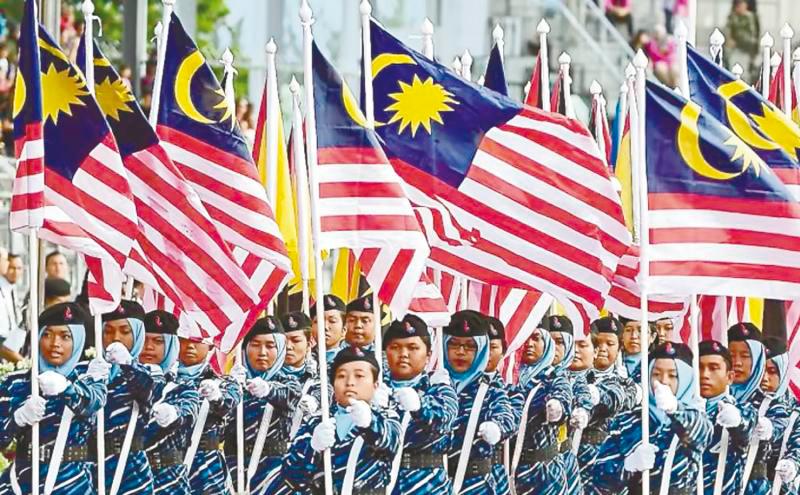RECENTLY, Defence Minister Datuk Seri Mohamad Hasan said the National Service Training Programme (NSTP), known as Program Latihan Khidmat Negara, would be revived and conducted in two phases, one while participants are in school and the other after the SPM exams.
The first NSTP was a three-month programme that kicked off in 2003 and was compulsory for selected teenagers aged 18 and above.
Annual intakes were between 85,000 and 95,000 trainees, with an average expenditure of RM500 million per year.
It was temporarily halted in 2015 due to cost-cutting measures and resumed in 2016 under NSTP 2.0, with about 20,000 trainees per year but was abolished in 2018 together with the National Civics Bureau programme over concerns of racial indoctrination and other reasons.
Phase two of NSTP 3.0 would focus predominantly on military training and scaled down to 25,000 trainees and 45 days so as not to exceed RM100 million a year in expenditure.
It will be conducted at 13 army reserve camps and one police training camp, with trainers from the army and police.
No doubt, such training is essential for all uniformed personnel as they will be working in teams.
Among soldiers, it is crucial to develop military camaraderie to provide cohesiveness among individual members to ensure permanent units function effectively as collective entities.
But for school leavers who will be going their separate ways after national service training, it would be interesting to know how many of those who underwent such training are keeping in touch with one another.
Will the percentage be higher or lower than in school or between classmates?
Nonetheless, what is the main purpose of NSTP? Is it to instil patriotism? If so, how is patriotism defined?
Phase one of NSTP would focus on teaching nationalism through the revamping of the uniformed unit co-curriculum in secondary schools. If so, what is nationalism?
Certainly, nationalism is well and good if citizens place national interest above all else and feel proud of our country and all our people.
But nationalism turns ugly when the uncouth, lacking in values, disparages other nations and nationals just to hate or feel superior over others.
Undoubtedly, those singing the national anthem, especially in flag-raising ceremonies are likely to be gushed with patriotic emotions.
Those proudly flying the Jalur Gemilang, notably during the national day celebrations, have often been portrayed as patriots by the media.
If so, are feelings alone or the number of national flags used to decorate buildings or fences accurate measures of patriotism?
Patriotism is much more than just emotions or demonstrating we are ready to serve or defend our country against enemies.
If we do not even make the effort to identify or ignore existential threats to our country, patriotic exercises carried out are all show and have no substance.
Our threats can come from within and without, such as corruption, deception and cyber warfare.
These cannot be fought using martial arts or ancient weapons, as they require integrity and knowledge through mastery of science, technology, engineering, mathematics and English.
But too many of our people are continuously being fed and believing misinformation and propaganda.
For example, blind supporters believe their political leaders are defending their race and religion by denigrating other races, which is against all religions, including their own.
Patriotism demands real hard work and effort. It requires concrete and positive actions for the good of our country and benefit our citizens.
Everyone can work towards nation-building and defence, including civilians and uniformed personnel during peacetimes and in wars.
All of us can contribute by studying or working hard, being productive and not being wasteful, living a healthy lifestyle and not becoming a burden to others or the government’s healthcare, paying the necessary taxes and not evading them, and contributing to charity and society.
Winning in major international sporting competitions may raise nationalistic feelings to frenzy heights, but they should not be equated with patriotism as such fervours are also exhibited by local football fans in support of foreign clubs, such as those in the English Premier League.
Hence, the success of NSTP starts with the powers that be.
If their understanding of patriotism is shallow, then the national service training is confined to superficial exercises and not much different from students seeking only academic qualifications in local colleges and universities.
Certificates, diplomas and degrees are awarded to those who learned by rote and assignments completed through copy and paste, or just outright plagiarism.
With poor understanding, graduates are unable to describe well in their own words what they have learned and failed in job interviews.
This has resulted in the large number of unemployed and underemployed graduates we have today.
Most are unable to speak or write English proficiently, which is essential to interacting with colleagues, customers and suppliers, especially in firms competing for international business.
Whenever I attended seminars or workshops, I would prepare a list of questions in advance and participate actively during training.
But most of the trainees sent by their companies to attend training are not keen to learn, shying away from asking questions or making comments.
So, instead of making it compulsory for those selected to attend NSTP 3.0, it would be better to make it on a voluntary basis.
If responses exceed the quota of 25,000 trainees, then selection can be made from those who have applied, making training more meaningful and productive.
Comments: letters@thesundaily.com









